Senators hear perspectives on a new relationship from Northern Indigenous communities

In September 2018, the Senate Committee on Aboriginal Peoples visited villages, towns, cities, and self-governing Indigenous communities across the Western Arctic to hear about how they envision a new relationship between Canada and Indigenous peoples.
YELLOWKNIFE, NORTHWEST TERRITORIES
A vision of zinc and glass that soars above Yellowknife's distinctive boreal landscape, the Legislative Assembly of the Northwest Territories was the first stop on the committee's fact-finding mission to the Western Arctic. It is the seat of the elected government in the Northwest Territories, where half of the population is Indigenous.
Self-governance, coordination with different levels of government and management of natural resources were just some of the items discussed with senators by a range of witnesses. These included representatives of small Indigenous communities, regional Indigenous organizations and political leaders in the Northwest Territories.
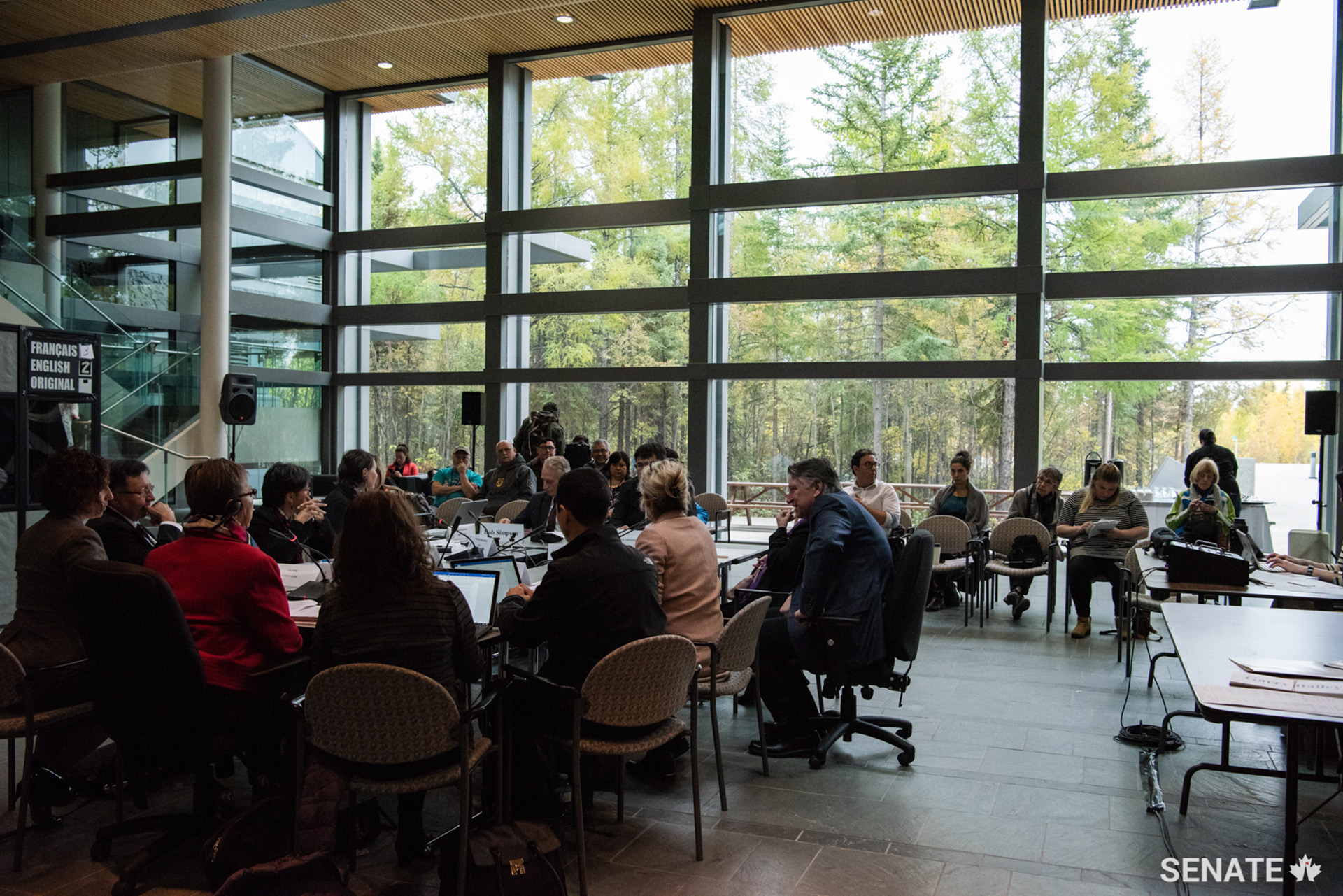
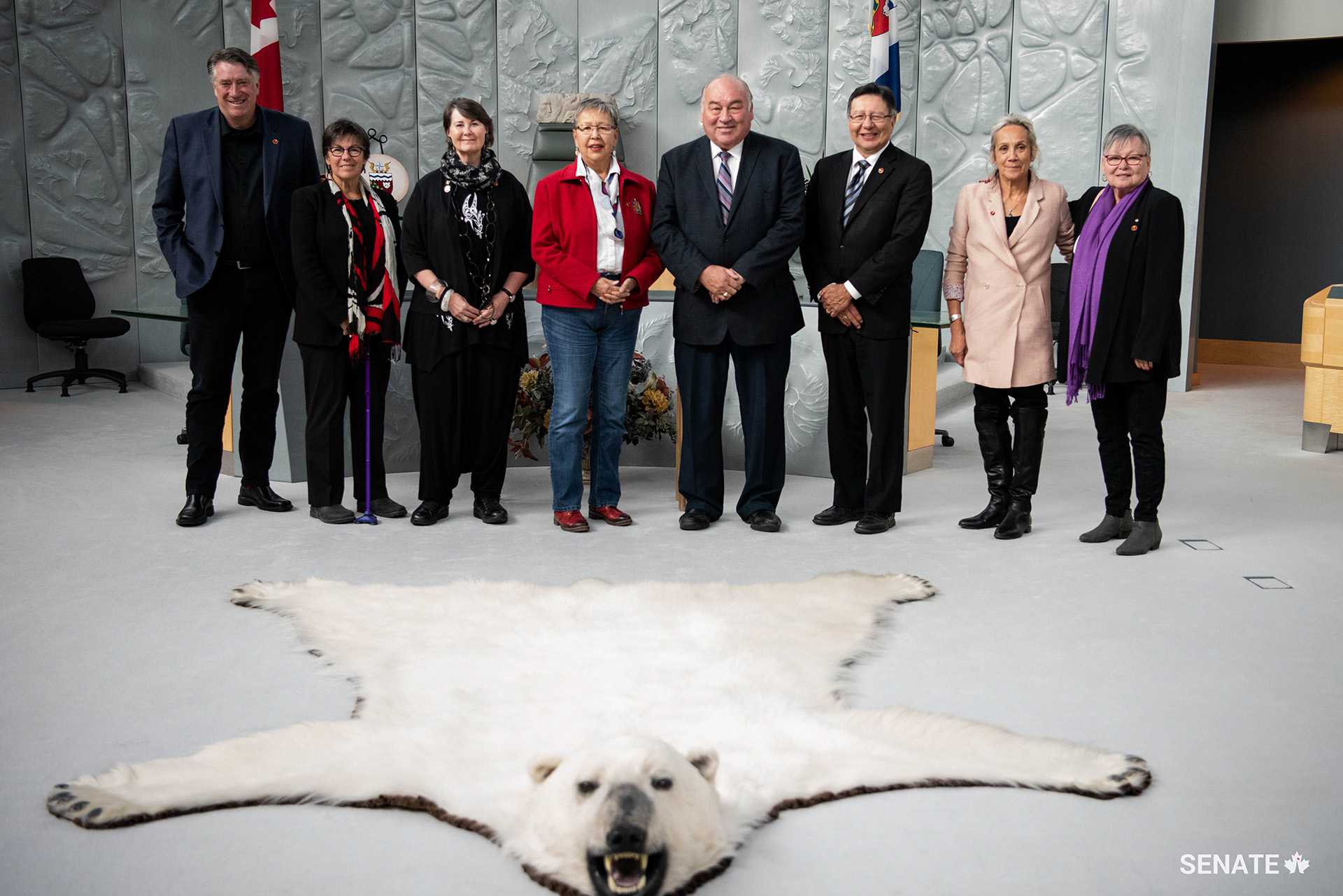
DÉLĮNE, NORTHWEST TERRITORIES
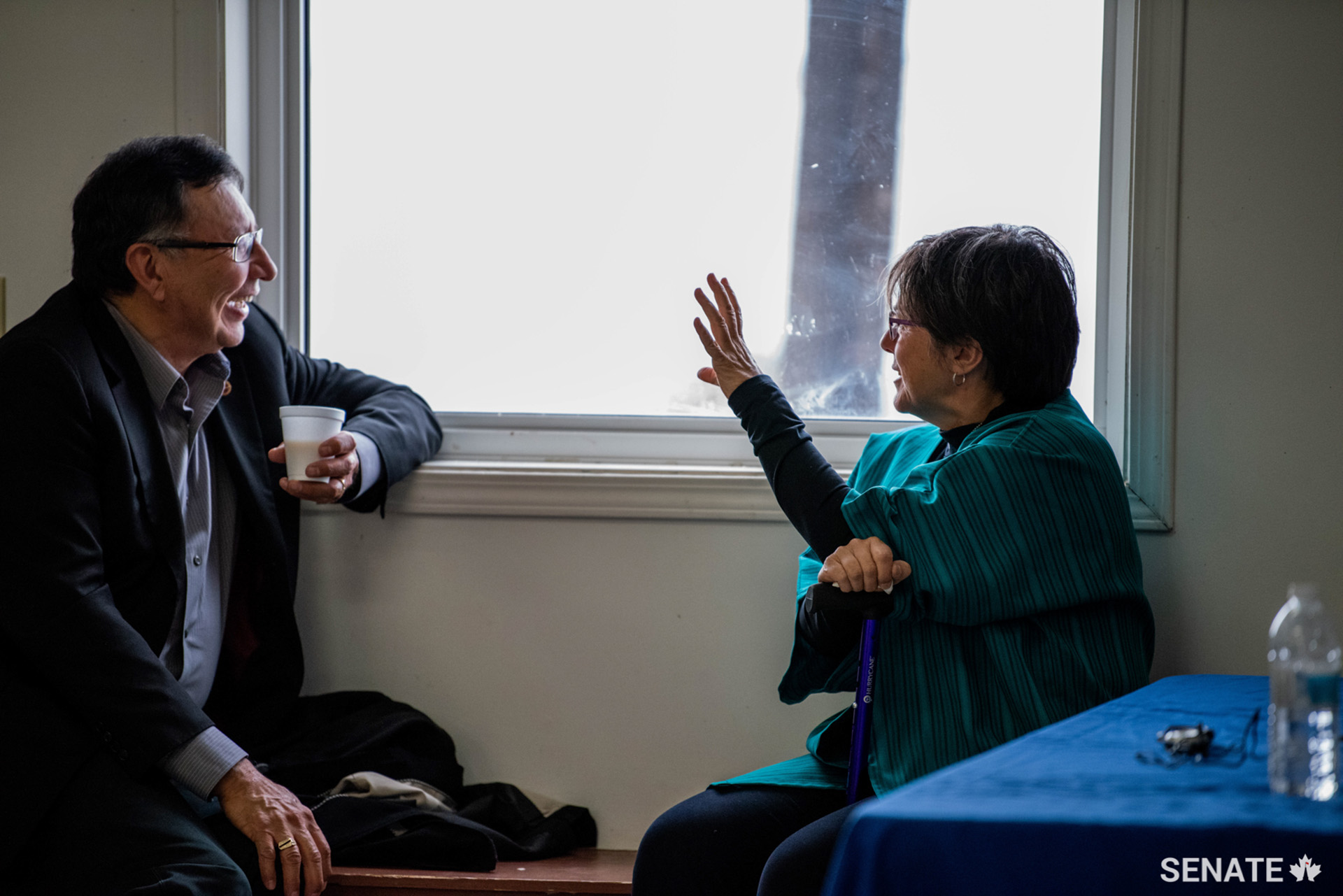
A prayer in the North Slavey language punctuated meetings in Délįne, a remote community of about 500 First Nations and Métis people on Great Bear Lake. Here, prayers end with the word “Mahsi,” meaning “thank you” — it sounds like the French word “merci.”
A community as rich in lore as it is in wildlife, Délįne locals will proudly recount that their lake holds the world record for the largest lake trout ever caught — 74 pounds — and claim that Canada's first game of hockey was played there in the early 1800s.
In 2015, Délįne community members performed a celebratory round dance in the Senate foyer after their self-government agreement was passed. Senator Tannas, who sponsored that self-government bill, was disappointed to hear that Délįne’s leaders have been unhappy with the support received from the federal government in the intervening years. ‘I think after the signing and the (celebratory) round dance, everyone on Canada’s side went away,’ Senator Tannas told the leaders, recognizing the need to get self-government off to a better start.
Committee chair Senator Lillian Eva Dyck admired the community's "beautiful landscape,” but senators heard that local officials fear for the future of their land due to climate change - their winter road saw only 20 days of functional commercial use last year.
"Next year, we could be down to 15, 10 days if we have milder weather," local Chief Leeroy Andre told the committee. Despite abundant potential hydrokinetic energy, the community still relies on fossil fuels that cannot always reach Délįne due to unreliable infrastructure. A lack of funding means they have not been able to explore alternative energy sources.

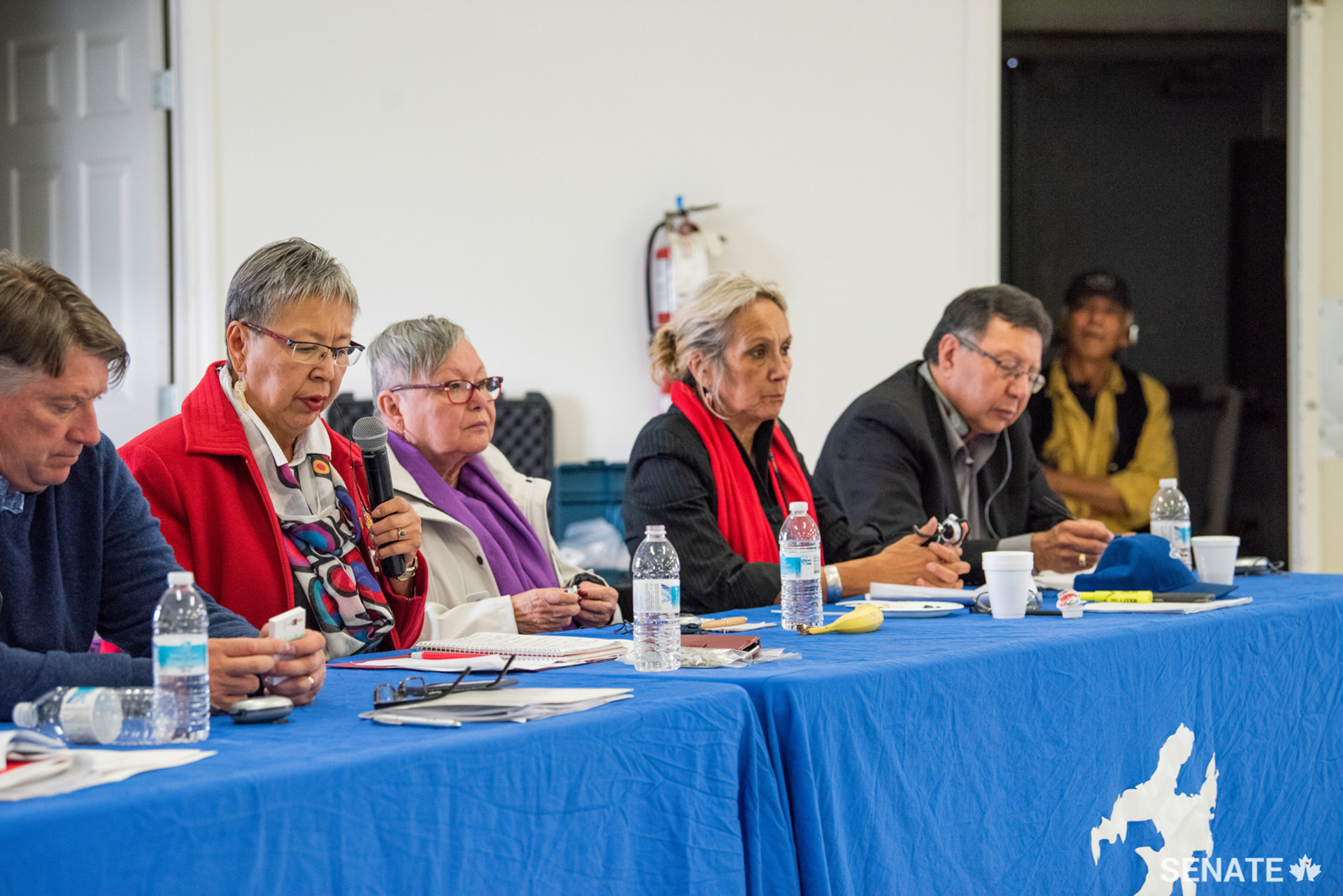
INUVIK, NORTHWEST TERRITORIES
While the term ‘Arctic’ accurately describes the northernmost stop on the committee’s fact-finding mission, local leaders in the town of Inuvik told senators that Canada needs to change the way it talks about this part of the country. Indeed, this multicultural town, with its diverse population and urban infrastructure, is far from the “pristine, snowy vision” that Councillor Natasha Kulikowski says other Canadians might expect. A that more accurately reflects the development potential in this part of the country, senators heard, would be ‘the North.’
During their time in Inuvik, senators engaged Mayor Jim McDonald and local Indigenous leaders in animated discussions on issues like the Indigenous communities’ relationships with their municipality, land claims and self-governance agreements.
"This is a very complex region," Senator Dyck observed.
The committee examined these complexities in meetings with the Gwich'in Tribal Council and the Inuvik Community Corporation, and they discussed how the various groups of Indigenous and non-Indigenous peoples strive for a cooperative coexistence in Inuvik.
By the end of a day of meetings with community leaders and elders, committee deputy chair Senator Scott Tannas reflected on what senators had learned about relationships in this small community.
"It’s complicated, but it seems to work," he said.
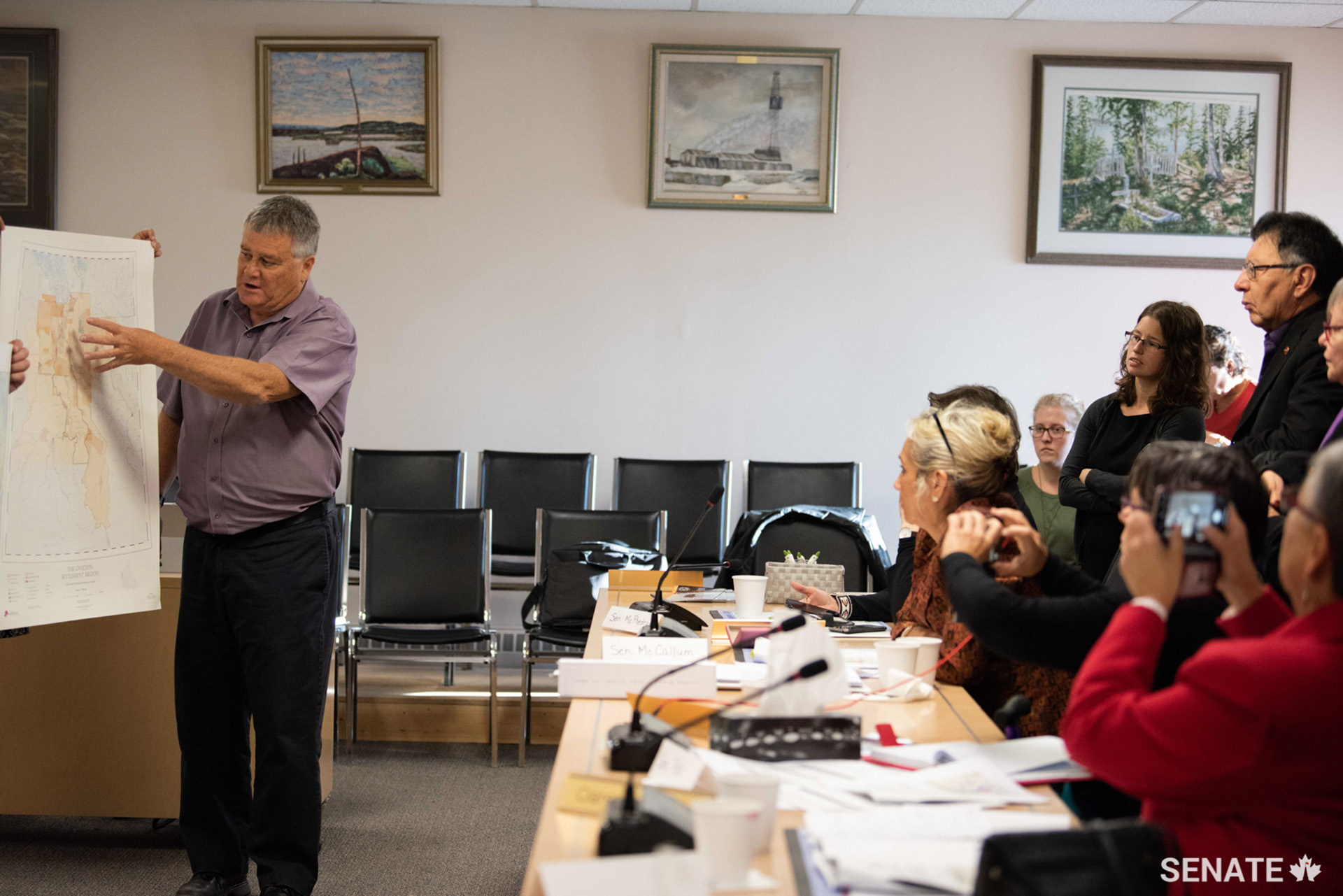
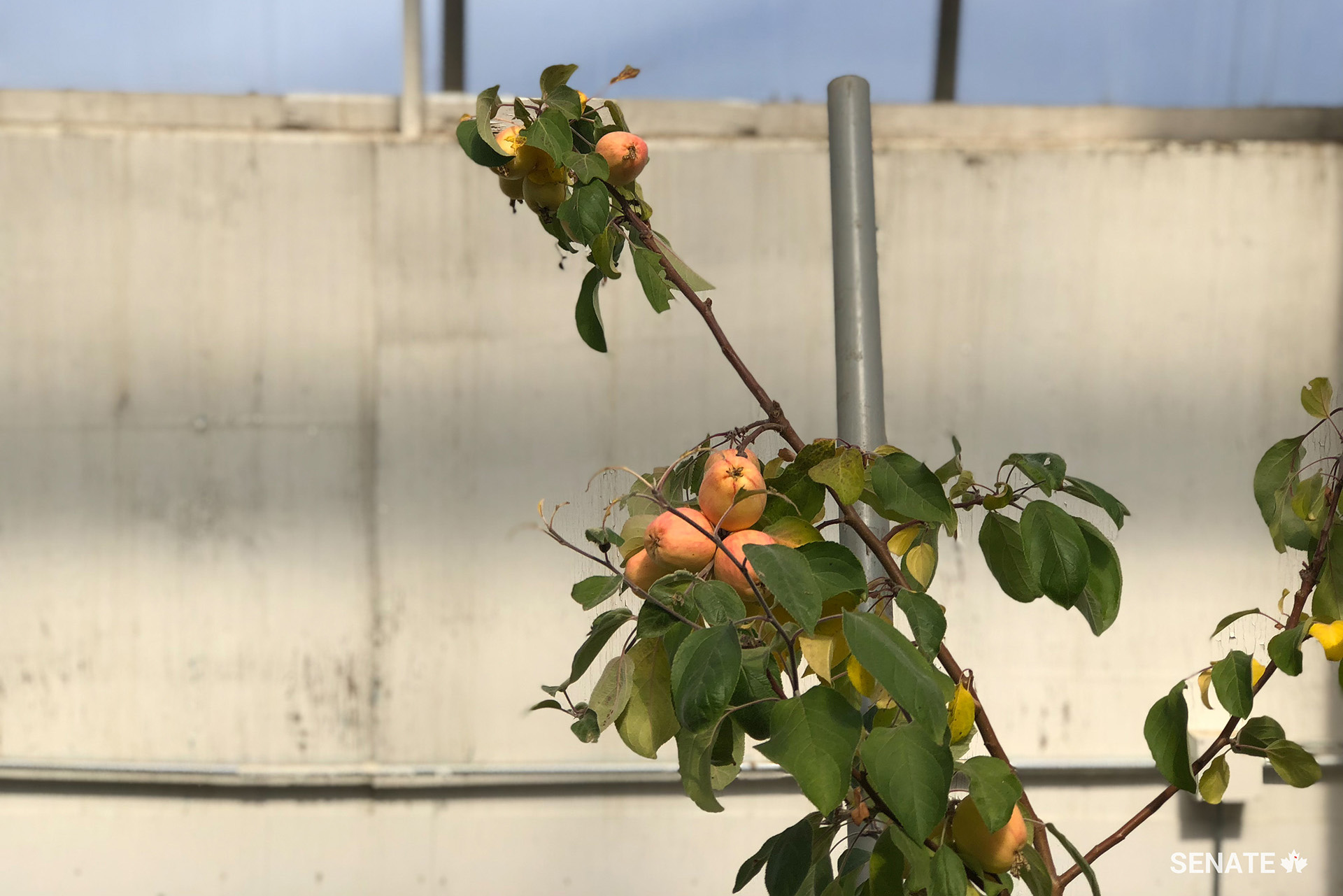
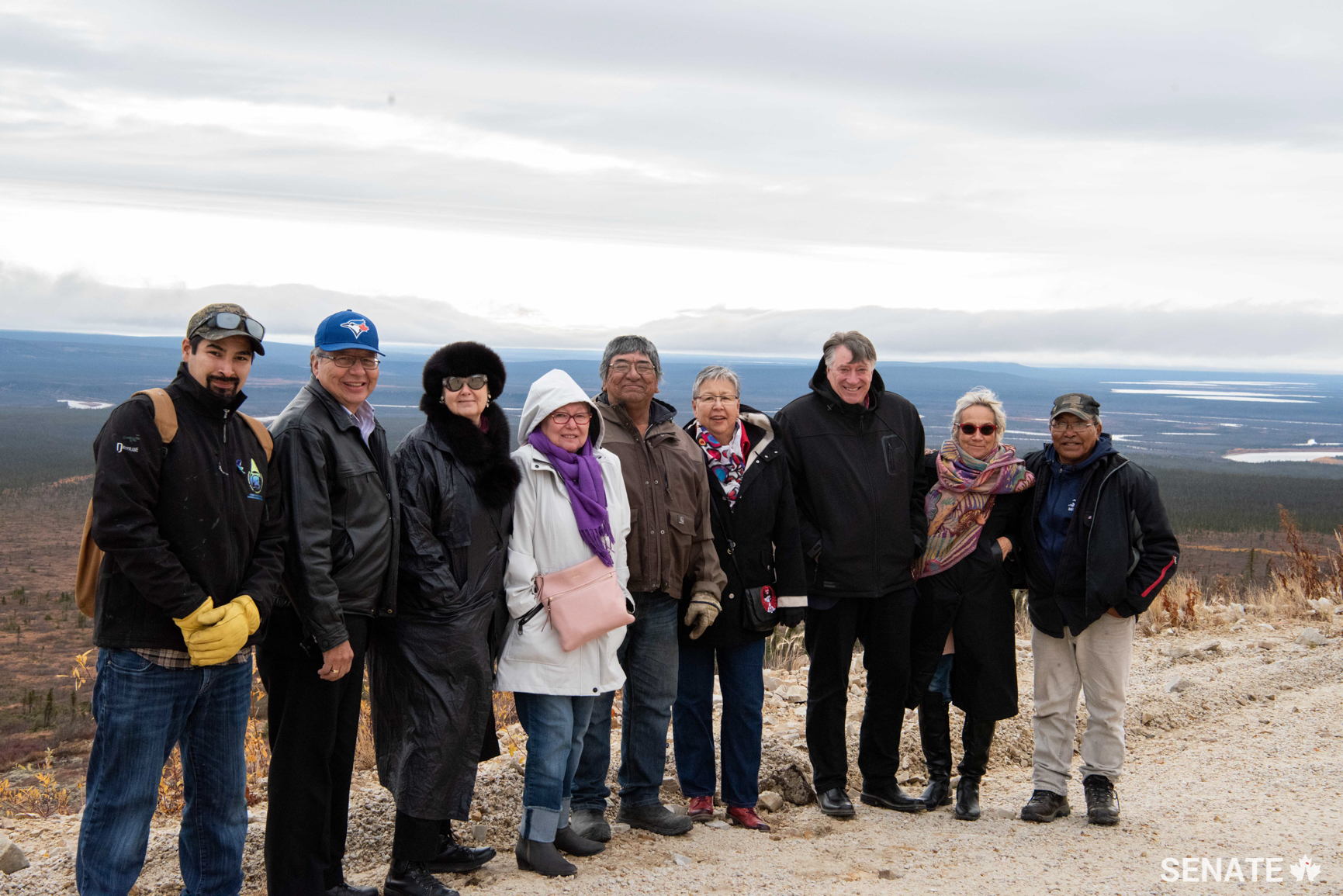
OLD CROW, YUKON
Over snow-peaked mountains lining the Arctic Ocean, the committee flew to Old Crow on the fourth day of their fact-finding mission. Senators settled into deep conversation with Roger Kyikavikchik, an Elder in the 221-person community.
He painted a rich picture of a close-knit community in touch with its roots; a community that hunts, trades furs, and eats food caught or grown on the land.
Senators heard that the land claim agreement between Canada and the Yukon government 25 years ago, for which the Vuntut Gwitchin First Nation was a signatory, "gave certainty to the area." However, elders reminded the committee that this community still has significant challenges — like shortfalls in the financial agreement they have with Canada, managing the extreme climate, adapting to climate change and food insecurity.
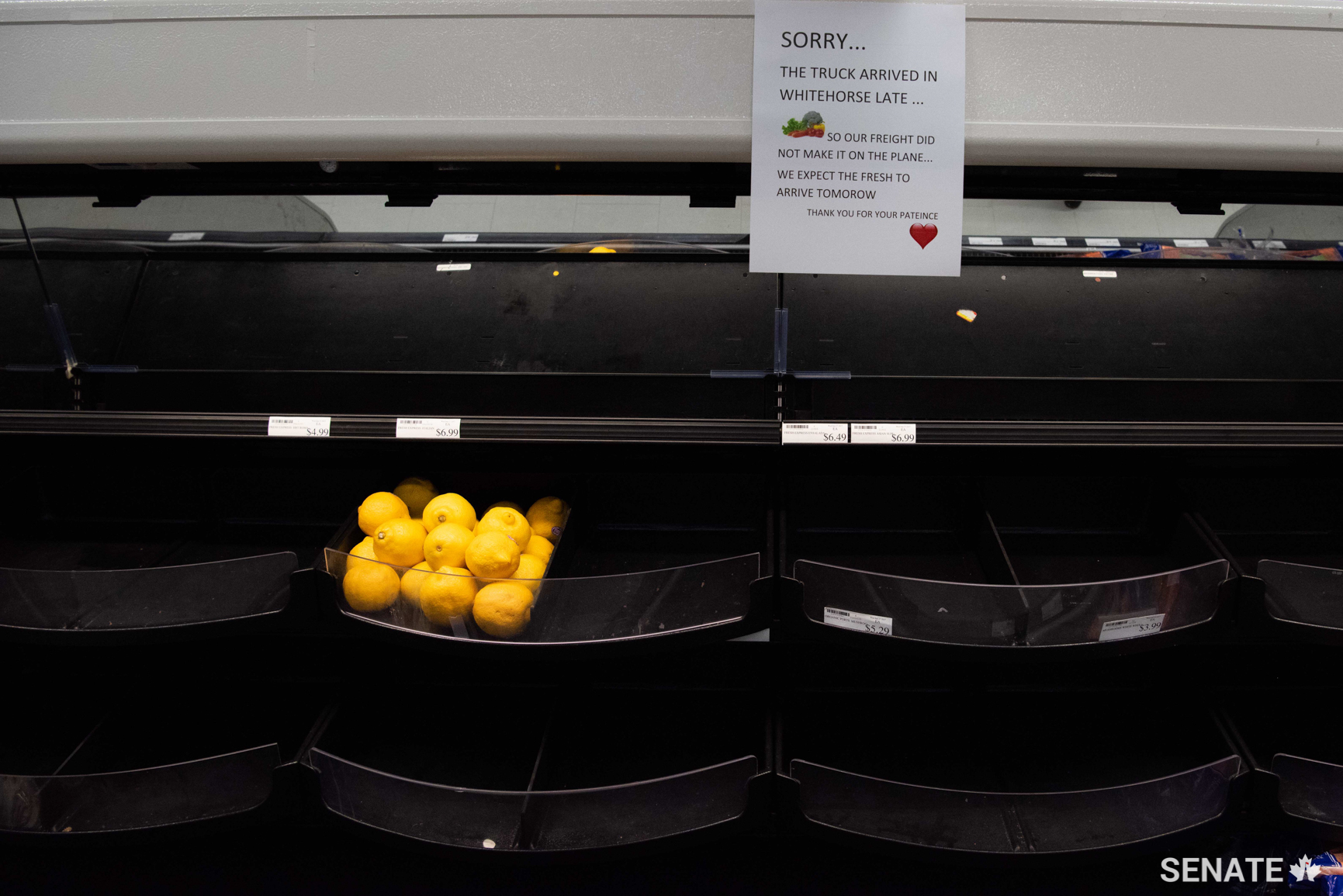
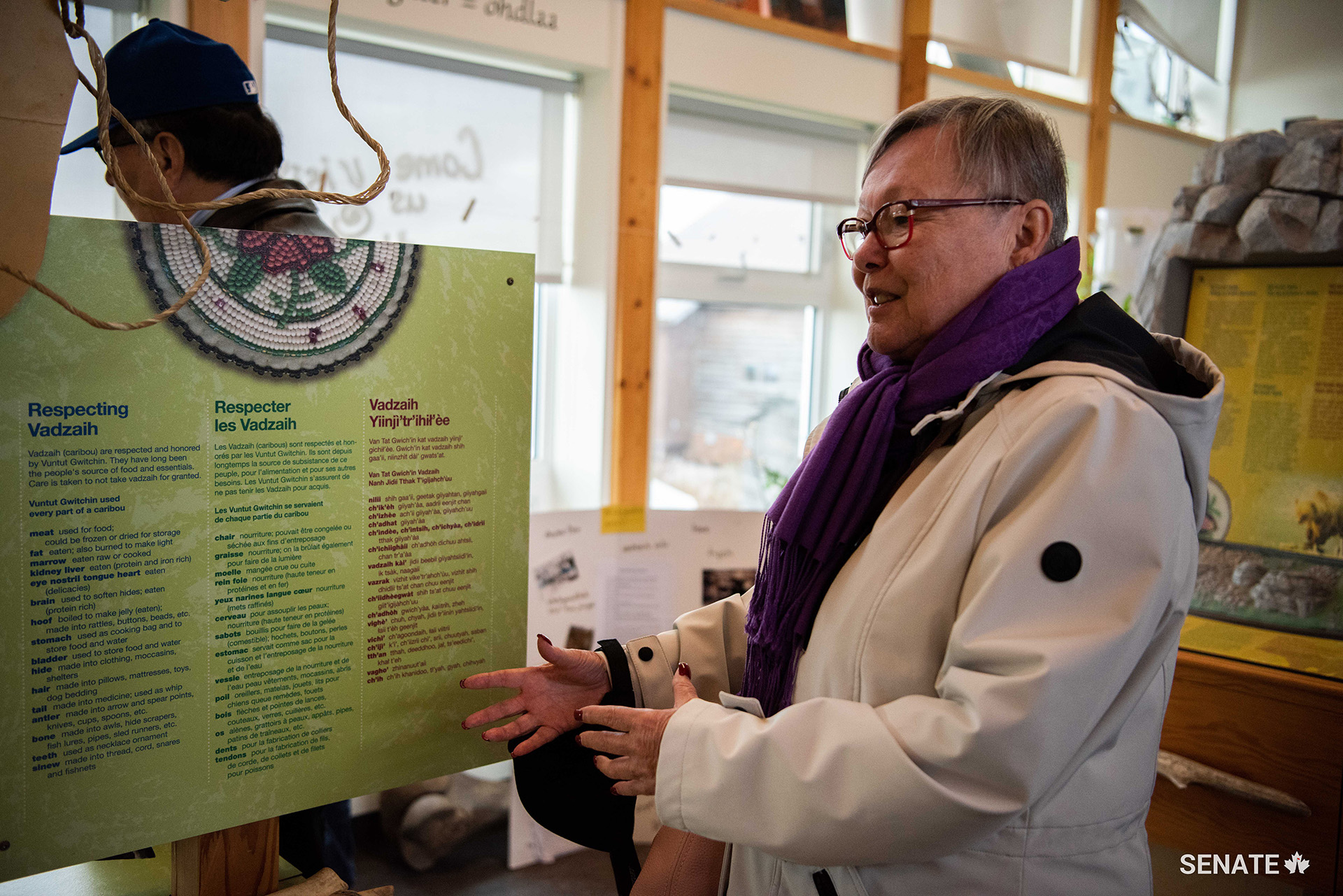
WHITEHORSE, YUKON
Catch a bus in Whitehorse and you’ll see the Yukon capital’s commitment to ensuring Indigenous peoples’ voices are heard. Many of the city’s buses are decorated in bright Indigenous art.
“Indigenous peoples don’t want us to tell their story,” Whitehorse Mayor Dan Curtis told the committee.
A diverse group of students, researchers, staff and alumni at Yukon College joined senators to discuss their challenges in Whitehorse. From bureaucratic funding applications to the culture shock students experience when moving to a bigger city for college or university, Indigenous students face difficulties when embarking on higher-level education. Nevertheless, students spoke about their desire to bring their education and knowledge back to their communities, to "work in areas that can promote self-sufficiency, self-determination, self-reliance."
Leaders from the Carcross/Taigish First Nation joined the committee for their final meeting in Whitehorse. They talked about challenges with insufficient funding and impenetrable bureaucracy, a struggle common to many of the self-governing nations the committee met with throughout the North.
Reflecting on the committee’s fact-finding across the Western Arctic, Senator Tannas remarked on the richness of both traditional knowledge and resources in the North. “We in the South have a responsibility to ensure northern communities are supported in maximizing their significant economic development potential.”
Senator Dyck considered the issues that had emerged, and the next steps for the committee as they work on a report on the new relationship between Indigenous peoples and Canada.
“The report we write on this will not just sit on a shelf,” Senator Dyck said.
“We will bring the voices of these communities back to Ottawa, and we will apply pressure on the government to act on their words.”
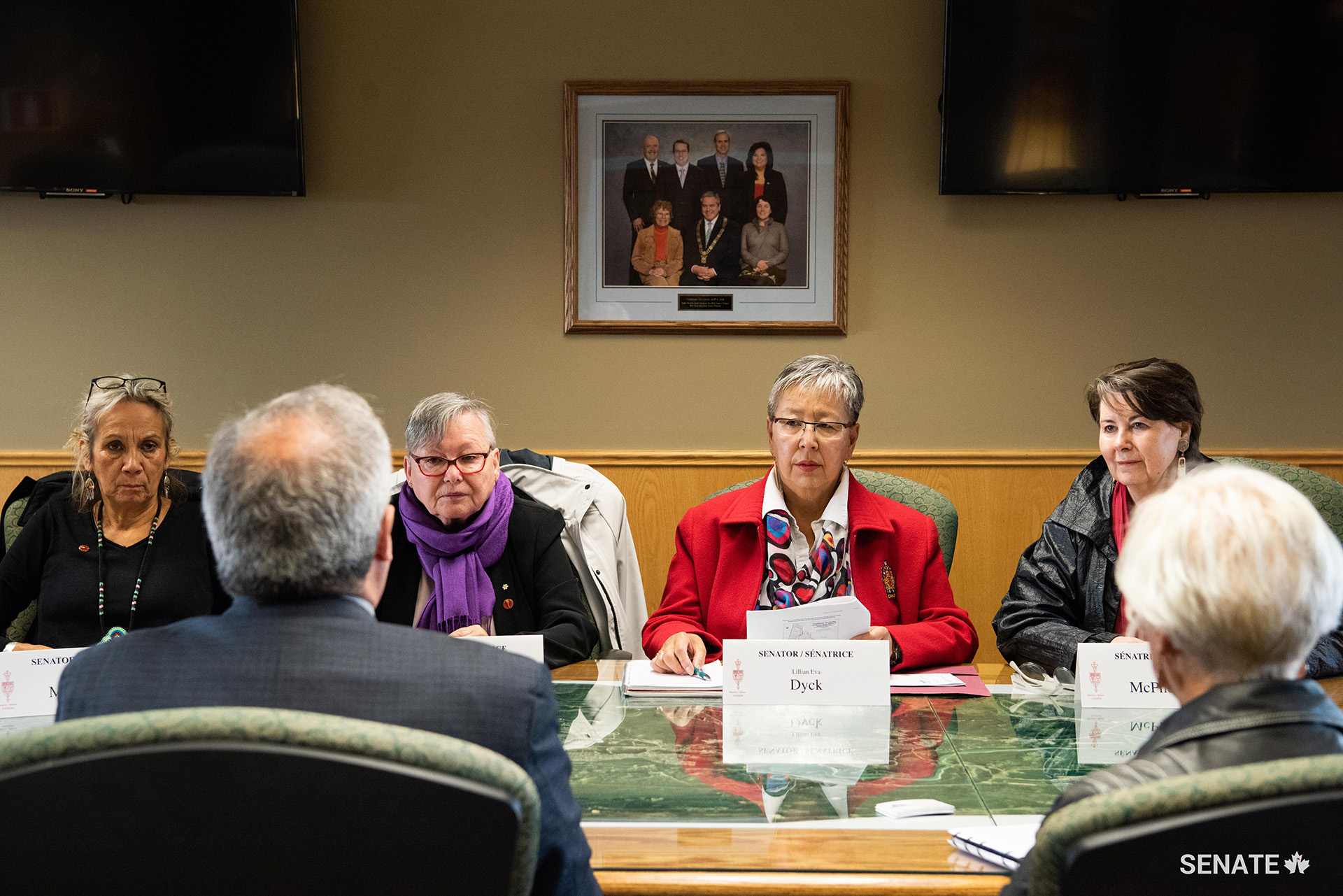
*Please note that as of July 31, 2022, the name of the Senate Committee on Aboriginal Peoples was changed to the Senate Committee on Indigenous Peoples. More information about this change can be found here.
Related articles
Tags
Committee news
Senators hear perspectives on a new relationship from Northern Indigenous communities

In September 2018, the Senate Committee on Aboriginal Peoples visited villages, towns, cities, and self-governing Indigenous communities across the Western Arctic to hear about how they envision a new relationship between Canada and Indigenous peoples.
YELLOWKNIFE, NORTHWEST TERRITORIES
A vision of zinc and glass that soars above Yellowknife's distinctive boreal landscape, the Legislative Assembly of the Northwest Territories was the first stop on the committee's fact-finding mission to the Western Arctic. It is the seat of the elected government in the Northwest Territories, where half of the population is Indigenous.
Self-governance, coordination with different levels of government and management of natural resources were just some of the items discussed with senators by a range of witnesses. These included representatives of small Indigenous communities, regional Indigenous organizations and political leaders in the Northwest Territories.


DÉLĮNE, NORTHWEST TERRITORIES

A prayer in the North Slavey language punctuated meetings in Délįne, a remote community of about 500 First Nations and Métis people on Great Bear Lake. Here, prayers end with the word “Mahsi,” meaning “thank you” — it sounds like the French word “merci.”
A community as rich in lore as it is in wildlife, Délįne locals will proudly recount that their lake holds the world record for the largest lake trout ever caught — 74 pounds — and claim that Canada's first game of hockey was played there in the early 1800s.
In 2015, Délįne community members performed a celebratory round dance in the Senate foyer after their self-government agreement was passed. Senator Tannas, who sponsored that self-government bill, was disappointed to hear that Délįne’s leaders have been unhappy with the support received from the federal government in the intervening years. ‘I think after the signing and the (celebratory) round dance, everyone on Canada’s side went away,’ Senator Tannas told the leaders, recognizing the need to get self-government off to a better start.
Committee chair Senator Lillian Eva Dyck admired the community's "beautiful landscape,” but senators heard that local officials fear for the future of their land due to climate change - their winter road saw only 20 days of functional commercial use last year.
"Next year, we could be down to 15, 10 days if we have milder weather," local Chief Leeroy Andre told the committee. Despite abundant potential hydrokinetic energy, the community still relies on fossil fuels that cannot always reach Délįne due to unreliable infrastructure. A lack of funding means they have not been able to explore alternative energy sources.


INUVIK, NORTHWEST TERRITORIES
While the term ‘Arctic’ accurately describes the northernmost stop on the committee’s fact-finding mission, local leaders in the town of Inuvik told senators that Canada needs to change the way it talks about this part of the country. Indeed, this multicultural town, with its diverse population and urban infrastructure, is far from the “pristine, snowy vision” that Councillor Natasha Kulikowski says other Canadians might expect. A that more accurately reflects the development potential in this part of the country, senators heard, would be ‘the North.’
During their time in Inuvik, senators engaged Mayor Jim McDonald and local Indigenous leaders in animated discussions on issues like the Indigenous communities’ relationships with their municipality, land claims and self-governance agreements.
"This is a very complex region," Senator Dyck observed.
The committee examined these complexities in meetings with the Gwich'in Tribal Council and the Inuvik Community Corporation, and they discussed how the various groups of Indigenous and non-Indigenous peoples strive for a cooperative coexistence in Inuvik.
By the end of a day of meetings with community leaders and elders, committee deputy chair Senator Scott Tannas reflected on what senators had learned about relationships in this small community.
"It’s complicated, but it seems to work," he said.



OLD CROW, YUKON
Over snow-peaked mountains lining the Arctic Ocean, the committee flew to Old Crow on the fourth day of their fact-finding mission. Senators settled into deep conversation with Roger Kyikavikchik, an Elder in the 221-person community.
He painted a rich picture of a close-knit community in touch with its roots; a community that hunts, trades furs, and eats food caught or grown on the land.
Senators heard that the land claim agreement between Canada and the Yukon government 25 years ago, for which the Vuntut Gwitchin First Nation was a signatory, "gave certainty to the area." However, elders reminded the committee that this community still has significant challenges — like shortfalls in the financial agreement they have with Canada, managing the extreme climate, adapting to climate change and food insecurity.


WHITEHORSE, YUKON
Catch a bus in Whitehorse and you’ll see the Yukon capital’s commitment to ensuring Indigenous peoples’ voices are heard. Many of the city’s buses are decorated in bright Indigenous art.
“Indigenous peoples don’t want us to tell their story,” Whitehorse Mayor Dan Curtis told the committee.
A diverse group of students, researchers, staff and alumni at Yukon College joined senators to discuss their challenges in Whitehorse. From bureaucratic funding applications to the culture shock students experience when moving to a bigger city for college or university, Indigenous students face difficulties when embarking on higher-level education. Nevertheless, students spoke about their desire to bring their education and knowledge back to their communities, to "work in areas that can promote self-sufficiency, self-determination, self-reliance."
Leaders from the Carcross/Taigish First Nation joined the committee for their final meeting in Whitehorse. They talked about challenges with insufficient funding and impenetrable bureaucracy, a struggle common to many of the self-governing nations the committee met with throughout the North.
Reflecting on the committee’s fact-finding across the Western Arctic, Senator Tannas remarked on the richness of both traditional knowledge and resources in the North. “We in the South have a responsibility to ensure northern communities are supported in maximizing their significant economic development potential.”
Senator Dyck considered the issues that had emerged, and the next steps for the committee as they work on a report on the new relationship between Indigenous peoples and Canada.
“The report we write on this will not just sit on a shelf,” Senator Dyck said.
“We will bring the voices of these communities back to Ottawa, and we will apply pressure on the government to act on their words.”

*Please note that as of July 31, 2022, the name of the Senate Committee on Aboriginal Peoples was changed to the Senate Committee on Indigenous Peoples. More information about this change can be found here.


